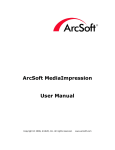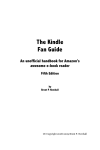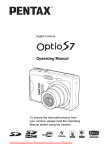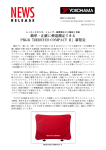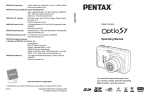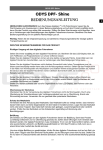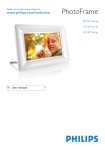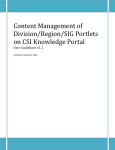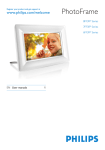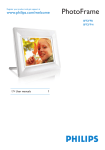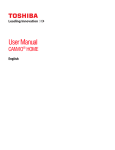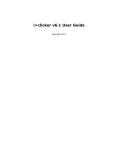Download USER MANUAL
Transcript
2 USER MANUAL 13 44601 Fremont Blvd., Fremont, CA 94538, USA Tel: +1.510.440.9901 • Fax: +1.510.440.1270 • www.arcsoft. com Copyright © 2010 ArcSoft, Inc. All rights reserved. ArcSoft, the ArcSoft logo, and ArcSoft TotalMedia Extreme are registered trademarks of ArcSoft, Inc. in the United States. All other product and companies named herein may be trademarks of their respective owners. 14 About ArcSoft ArcSoft, Inc. is an industry leading software developer of multimedia technologies and applications across desktop and embedded platforms. Working closely with major OEM manufacturers, ArcSoft offers a full line of imaging and video solutions that enhance the features, performance, and user experience of mobile phones, digital cameras, optical drives, personal computers, and consumer electronics devices. Established in 1994, ArcSoft is headquartered in Fremont, California, with regional commercial and development facilities in Europe and the Far East. For further details, please visit us at our corporate web site: www.arcsoft.com. 15 Table of Contents 1. Introduction ......................................... 1.1 Installation .......................................... 1.2 System Requirements ......................... 1.3 Key Features ....................................... 1.3 Workflow Overview ............................. 1 2 3 5 8 2. Getting Started ...................................... 9 2.1 Media Browser ..................................... 10 2.11 Views ........................................... 10 2.12 Preview Area ................................ 13 2.13 Right Click Menu ........................... 16 3. Actions .................................................. 19 1. Import ................................................... 20 2. Photo Editing.......................................... 22 3. Share .................................................... 28 4. Archive .................................................. 33 5. Upload ................................................... 33 6. Geotag ................................................... 36 7. Slideshow .............................................. 37 8. Media Player .......................................... 40 9. Make Movie ............................................ 42 10. Ordering Photo Gifts and Prints ............. 45 11. Creating a Photobook ............................ 46 10. Viewing Photos ...................................... 47 4. Customizing Program ............................ 49 5. Extras Menu .......................................... 50 16 Reference ................................................. 54 Troubleshooting .............................................. 56 Customer Support ........................................... 60 Technical Support ............................................ 61 Licensing Agreement ....................................... 62 Index .............................................................. 66 1 1. Introduction Installation System Requirements Key Features This Introduction covers the installation and system requirements and provides a list of the key features of Media Impression 2. The rest of the user manual covers how to use the user interface, how to manage and import specific media files, and how to create a movie and use the webcam. There is also a chapter that covers the program’s menus and commands. 2 Chapter 1: Introduction 1.1 1. 2. 3. 4. Installation Insert the CD into your CD-ROM drive. The installer should start automatically. Follow the on-screen instructions to complete the installation. When prompted, enter the license key located on the sleeve in which your software cd came in. Take note as to where the program is installing, and where it can be found in the Start menu. Note: If the installer does not start automatically, you will need to run it manually: 1. Insert the CD into your CD-ROM drive. 2. Click Start>Run. 3. In the Run dialog, type “X:/setup.exe”. (“X” is the drive letter associated with your CD-ROM drive. This letter will vary from system to system.) 4. Click OK. 5. Follow the on-screen instructions to complete the installation. 3 Chapter 1: Introduction 1.2 System Requirements Minimum System RequirementsFor dows: For Windows: OS - Windows XP/SP2/Vista/Windows 7 CPU - Intel Pentium IV 1.6 GHz or equivalent AMD Athlon Memory - 512 MB RAM (256 MB recommended) Hard disk space - 300 MB available hard disk space Display - 16-bit color monitor at 1024 x 768 or higher Graphics - NVIDIA MX440 or ATI 9200 or higher Other - Apple QuickTime(R) 7.0 or higher recommended - Microsoft DirectX 9.0c or higher - Microsoft Windows Media Player 9.0 or higher -Internet Explorer 6.0 SP1 or higher 4 Chapter 1: Introduction For Mac: OS - Mac OS x 10.3, 10.4, 10.5, 10.6 CPU - PowerPC G4 800 MHz processor or equivalent (Power PC G5 or Intel Core Duo processor recommended) Memory - 768 MB or higher recommended Hard disk space - 300 MB available hard disk space (1 GB recommended) Display - 1024 x 768 pixels or higher recommended Graphics - QuickTime® 7.0 or higher recommended 5 Chapter 1: Introduction 1.3 Key Features • Auto face tagging automatically finds all faces in photos, groups them, and then tags them • Auto scene tagging automatically analyzes content of photos then tags them with different scenes • Auto rating automatically detects and rates poor-quality and high-quality photos • Supports AVCHD playback/edit/output • Supports two new raw files: .srf/.rw2 • Instantly create and play Photo Book in Media Browser or Photo Viewer • MJPEG optimization • Media Player: edit capture photo, save and share features • Photo Viewer: "Auto face beautify" to remove blemishes, clear face and automatically remove red-eye • Smoothly play slideshows • Upload videos to Vimeo website (Windows version only) Face beautify helps beautify the eyes, mouth, and skin of the face 6 Chapter 1: Introduction 7 Chapter 1: Introduction Welcome to ArcSoft MediaImpression™ 2, a fun and powerful management tool for your media files. Easily create and share projects featuring your photo, video, and music files. Edit, enhance and add creative effects to your photos. Create your own movies or photo slideshows, complete with soundtrack. Upload your files easily to YouTube™! Or share them with friends or family through simple email attachments, photo sharing sites, or archive to a CD/DVD disc. Standard Screen 8 Chapter 2: Start Page 2. Getting Started This chapter will help you start creating projects or manage your media files. The Start Page offers two tabs. The "Standard" tab lists common starting points for the program. The "Order Photos Gifts & Prints" tab provides a shortcut of the "Order Photo Gifts & Prints" module. Standard The "Standard" tab consists of two columns: Category and Action. You can choose the type of the media files you want to view and edit. The program launches the Media Browser for this type of media file. Or you can also start by selecting the task you want to work on. You can also Configure the Start Page to show the tasks that you want. Order Photo Gifts & Prints Products are categorized into three groups—Prints, Gifts, and Photo Books. Choose a product and go directly to the "Order Photo Gifts & Prints" module. Click "View Price List" to display the price list; click "View Shopping Cart" to go to your cart. Note: Check the "Skip this page when you launch the program" option to go directly to the Media Browser next time. Order Photo Gifts & Prints Screen 9 Chapter 2: Start Page 2.1 Media Browser The Media Browser occupies the largest section of the main screen. It consists of two sections: Views and Preview Area. 2.11 Views Appears on the left side of the Media Browser. Views provide tools and options for you to locate, examine, and organize your media files. The first time you use the program, Folders is the primary view. The Folders view displays your files based on their location on your hard drive. They allow you to locate, examine, and organize your media files. Preview area Views 10 Chapter 2: Start Page The types of media files you view are determined by the Categories drop-down list. To change the type of the media files you want to view, select from the Categories drop-down list. The first time you use the program, Folders is the primary view. You can display other views by selecting relevant icons below. If you want to close a certain view, you can either click the "Close" button in that view or unselect its icon. Activity History - The Activity History view actually is a database which can record the user's operation history automatically. You can quickly and easily search for your media files according to the operation date and type. In the Activity History view, files are displayed based on the user's operations chronologically. Calendars - The Calendars view uses the file's created date (shot time for EXIF images) to organize your media files. In the Calendars view, you can switch between "Year Mode", "Month Mode", "Day Mode", and "Tree Mode" by using the options icon . Then select a year, a month, or a day to display all media files that were created or last modified. Favorite Folders - The Favorite Folders view contains the media files that you like most. You can add the folders in Folders view to your Favorite Folders by dragging and dropping or using the "Add to Favorite Folders" in the right-click menu. Selecting a folder displays its content. Media files are displayed in the Preview Area and subfolders are shown in the Favorite Folders view. 11 Chapter 2: Start Page The options of Favorite Folders view are available by clicking the Options icon or by right-clicking the folder. The options include deleting the folder from Favorite Folders, inserting a new folder, renaming the folder, relinking the folder if you have moved it, and refreshing the folder content. Folders - The Folders view is where you can browse for media files using a classic Windows style folder tree view. Selecting a folder displays its contents. Media files are displayed in the Preview Area and sub-folders are shown in the Folders view. Import History - The Import History view gives you a convenient way to browse for media files based on how and when you first copied them to your computer. In the Import History view, select the date to view media files imported then. Internet - The Internet view allows you to manage online files without having to download them to your local computer. Just select them as your other offline files and apply supported actions as you want. All supported types of accounts are listed in the Internet view. Simply click "Login" next to the account to access it. Rating - The Rating view provides you a unique way to manage and search your media files, based on 5 levels of ratings. Saved Selection Criteria - saves the set of conditions you have selected in the other views. This way, the next time you use the program you can easily recreate your selection. Tags - The Tags view provides a list of tags that you can use to categorize your media files. By attaching tags to your media files, you can quickly and easily search for your media files that pertain to specific events, people, or trips. MediaImpression is designed to allow you to sort files by a combination of different views. A combination search lets you find specific media files based on criteria from multiple views. Just put a check next to each view to include in the search and select the search criteria for that view. 12 Chapter 2: Start Page Click Configure Browser to configure the Views and Actions differently for each category of media file. Note: The width of the Views can be adjusted by clicking and dragging on the bar that divides the Views from the Preview Area. The Views can be displayed or hidden by clicking their relevant icon at the bottom of the view area. Or click the cross icon on the view bar to close it. 2.12 Preview Area Appears in the center section of the Media Browser. Displays media file thumbnails and detailed information about the files contained in the selected folder. Display Area The Display Area appears below the Toolbar. It occupies the largest part of the screen. Media files are displayed here when they are in the chosen Media Browser category and they meet the criteria selected in the active Views. Double-click files in the Display Area to open or play them. To maximize the Display Area on the screen, hide the Views by clicking on the icon that divides the two sections. Toolbar On the top of the screen, above the Display Area, you will see a toolbar with the following controls: Rotate left: Rotates the selected photos 90-degrees counterclockwise Rotate right: Rotates the selected photos 90-degrees clockwise. 13 Chapter 2: Start Page Batch: Presents a dropdown menu that contains the following items: • Batch Convert Launches the Batch Convert File dialog box which enables you to quickly and easily change the file format for many media files at once. • Batch Resize Launches the Batch Resize dialog box which enables you to quickly and easily resize many media files at once. • Batch Rename Launches the Batch Rename dialog box which enables you to quickly and easily rename many media files at once. Attach Rating: Enables you to attach a rating to or unrate the selected media files in the Preview area. Auto Rating: Lets the program automatically attach rating to the selected media files in the Preview Area. The rating is based upon the quality of the media files. Attach Tags: Attaches the chosen tag to the selected media files in the Preview Area. Auto Face Tagging: Lets the program automatically identify the facial area of the selected media files and categorize those of the same person into one group using a face tag. After auto face tagging is complete, a dialog box will appear for you to filter the associated faces for each face group and to arrange these face tags. Auto Scene Tagging: Lets the program automatically attach scene tag to the selected media files in the Preview Area. The scene tagging is based upon the content of the media files. Delete: Sends the selected media files to the recycle bin. Group by: Organizes the media files into different categories in the Preview Area. Sort by: Sets the sort criteria for the files and folders in the Preview Area. 14 Chapter 2: Start Page View by: Selects the display mode for files and folders in the Preview Area; you can view the file thumbnails only or together with their detailed information. Quick Search: Sorts the displayed files by the characters you type in. Those files whose folder name, file name, tags, etc. contain these characters will be sorted out and displayed in the Display Area. Select All/Deselect All: Selects/Deselects all the displayed files. Resize Thumbnail Slider: Makes the thumbnails larger or smaller within the Display Area. Clicking the left button fits as many thumbnails as possible into the Display Area. Clicking the right button makes the thumbnails as large as possible. By moving the slider, you can adjust the thumbnail size by hand. 15 Chapter 2: Start Page 2.13 Right Click Menu The Right-Click menu provides quick access to useful and common commands and actions. To access the Right-Click menu, simply click the right mouse button on a media file thumbnail or group of selected thumbnails in the Display Area. Rotate Left: Rotates the selected photos 90-degrees counterclockwise. Rotate Right: Rotates the selected photos 90-degrees clockwise. Batch: Presents a drop-down menu that contains the following items: Batch Convert Launches the Batch Convert File dialog box which enables you to quickly and easily change the file format for many media files at once. Batch Resize Launches the Batch Resize dialog box which enables you to quickly and easily resize many media files at once. Batch Rename Launches the Batch Rename dialog box which enables you to quickly and easily rename many media files at once. Exif Audio Control: Presents a drop-down menu that contains the following items: Play: Starts playing the attached audio. Stop: Stops playing the attached audio. Attach Audio...: Attaches a .WAV audio file to the selected photo file. Record New Audio...: Launches the Record New Audio dialog box which enables you to record a new .WAV audio file and attach it to the selected photo file. Set Wallpaper: Sets the currently selected photo as the wallpaper image for your desktop. Properties...: Launches the Properties dialog box which contains information about the active media file including: File Name, File Location, Modified Date, Resolution, File Description 16 Chapter 2: Start Page (editable), Metadata (i.e. EXIF and Geography Info), Attached Tags and Flags info. If there is an audio file attached, the playback controls and Save As button are shown to help you work with the audio file. The EXIF information can be exported as a text file in the Metadata tab. Open With: Opens the selected file in the chosen application. Cut (Ctrl+X): Copies the selected media files to the clipboard so they can be moved to another location by means of the Paste function (Ctrl+V). Pasting a cut file removes the file from its original location. Copy (Ctrl+C): Copies the selected media files to the clipboard so they can be copied to another location by means of the Paste function (Ctrl+V). Pasting a copied file does not remove the file from its original location. Paste (Ctrl+V): Inserts the media files currently saved to the clipboard into the current location. Copied files remain on the Clipboard after they have been pasted. Cut files are removed from the Clipboard after they have been pasted. Delete (DEL): Sends the selected media files to the recycle bin. Rename (F2): Changes the name of the selected file(s). If a single file is selected, it can be renamed in the Display Area; if multiple files are selected, the Batch Rename dialog box will appear. Select All (Ctrl+A): Selects all of the media files in the Preview Area. Select Folder: Selects all of the media files in the current folder. Refresh: Refreshes the content of the current Display Area. Explore: Opens the selected file in Windows Explorer. Attach Rating: Enables you to attach a rating to or unrate the selected media files. Auto Rating: Lets the program automatically attach rating to the selected media files in the Preview Area. 17 Chapter 2: Start Page Auto Face Tagging: Lets the program automatically identify the facial area of the selected media files and categorize those of the same person into one group using a face tag. Auto Scene Tagging: Lets the program automatically attach scene tag to the selected media files in the Preview Area. Attach Tags Enables you to attach a tag to the selected media files. Remove Tags Enables you to remove the tag icons from the selected media files. 18 Chapter 3: Actions 3. Actions The Program's Action buttons appear below the Media Browser. The available Actions differ depending on the category of media file you select in the Media Browser. They include: 1. Import 2. Photo Editing 3. Share 4. Easy Archive 5. Upload 6. Geotag 7. Slideshow 8. Media Player 9. Make Movie 10. Order Photo Gifts & Prints 11. Photo Book 12. Photo Viewer Action buttons 19 Chapter 3: Actions 1. Import To access the import window, click on the Import icon on the start page. ArcSoft MediaImpression allows you to import media files from compliant types of devices. The following are descriptions of all three functions of Import: Acquire, Import, and WebCam. Acquire: You can acquire images from connected TWAIN compliant devices such as scanners and some digital cameras. Assign names to image files as they are acquired (using today's date or a descriptive word). How to acquire images from a TWAIN compliant device: 1. Select a scanner or other TWAIN device from the dropdown list. 2. Choose the file format you want to use for the acquired images (JPG, BMP, TIF, PCX, TGA). 3. If you've selected JPG as the file format, select the image quality for the acquired images (Highest, High, Normal, Low). The lower the quality selected, the higher the level of compression applied. 4. Choose a destination folder for the photos by clicking "Browse" (folder icon) and navigating to the folder. 5. Choose a naming method (today's date or description). 6. Enter a description if applicable. 7. Click "Acquire." Import The Import action allows you to import media files to your computer from a camera or storage device. The Import window can be attached to the main window to let you preview and select the imported media files in the preview area by clicking the "Attach" button ; you can also click the "Detach" button to detach it. After importing, you can delete the original files from your device. 20 Chapter 3: Actions 1. Select a camera or storage device from the drop-down list. Note: By default, all the media files in the device will be imported to your computer. If you just want to import some of them, please go to the Folders view and select the files you want before importing. 2. Select a destination folder for the import media files by clicking the Browse button and navigating to the folder. 3. Select a naming rule for the subfolder. 4. Set the import options by checking the relevant checkboxes. Exclude files that have already been imported - Do not import the files that have been imported from the device. 5. Fix red-eye automatically - Automatically find and fix all redeyes. 6. Auto rating (Only photos) - Automatically attach rating to the imported photos. 7. Auto face tagging (Only photos) - Automatically categorize the photos of the same person into one group using a face tag. 8. Auto scene tagging (Only photos) - Automatically attach scene tag to the imported photos. 9. Attach a tag - Tag each file as you import it. Select the tag from the list or create a new tag. Click "Import" to start importing. WebCam This module makes it easy for you to capture still images and video directly from your webcam. Before capturing, you may want to adjust the capture settings, webcam settings, and snapshot/video resolution according to your requirements. 21 Chapter 4: Photo Editing Capture a still image by clicking the "Capture" button. Capture a group of images in burst mode by clicking the "Burst" button. Capture a video clip by clicking "Record Video" and then "Stop Recording." Settings: Allows you to adjust your capture settings, such as video device, burst number, audio device and audio input, etc. WebCam Settings: Allows you to adjust your webcam related preferences, such as brightness, contrast, hue and saturation, etc. Connect: Connect your webcam. (This icon is displayed when your webcam is not connected.) Disconnect: Disconnect your camera. (This icon is displayed when your webcam is connected.) 2. Photo Editing The Photo Editing module includes a complete set of built-in applications for you to edit your selected photos. They include: Photo Editing Tools Easy Fix Text and Clip Art Color Effects Photo Effects Face Beautify Frames and Edges Photo Editing Tools The Photo Editing Tools module includes a complete set photo enhancement, editing and retouching controls. The window can be stretched to provide a large size view of the active photo. 22 Chapter 4: Photo Editng Double click the module's tool bar to maximize the window to fill the computer screen. In addition to the large photo workspace, the Photo Editing Tools module includes five distinct sets of controls: Adjust: The Adjust controls are used to fix common photo problems quickly and without difficulty. Many of the features can also be found in the Easy-Fix. Retouch: The Retouch tools are divided into two groups: Touch Up and Paint. Clipboard: The Clipboard controls are used for selecting, copying and pasting elements from photo to photo. Edit Toolbar: Contains many editing tools to quickly make changes. Photo Tray: When multiple photos are selected for editing, their thumbnails are displayed in the tray below the active photo. Easy Fix The Easy Fix module is a step-based image editor designed to help you fix common photo problems quickly and easily. Simply add a check mark next to each enhancement you want to use and click "Next." Edit features include: Straighten it: This feature enables you to fix photos that appear to be tilted. Crop it: This feature enables you to trim photos. Fix Red-Eye: This feature makes it easy for you to remove red eyes. Red eyes are a common problem in flash photography. Add Brightness and Contrast: This feature helps bring out details in dark, low-contrast images. 23 Chapter 4: Photo Editing Sharpen it: This feature helps add detail to slightly blurred images. Adjust the Color: This feature is designed to fix photos that have unnatural color or appear too dark. It's also great for fixing scanned versions of old prints that have faded or whose colors have changed over the years. Make the Subject Stand Out: Each page of the Easy Fix features Reset and Undo/Redo buttons, allowing you to test different editing choices before moving to the next step. When you've reached the last page, click "Save As" to save your edited photo. You can choose to overwrite the original file or save a new one. If you selected multiple photos before launching the Easy Fix Wizard, a "Next Image" button lets you begin again using the next photo. Text and Clip Art The Text and Clip Art module includes all the tools you need to add fun and creative clip art and high-quality text to your photos. Text - Add your own custom words and phrases to your photos. Clip Art - Apply thought balloons, costumes and other fun and colorful graphics to your photos. Use the toolbar controls to resize, rotate and make other adjustments before saving the results. Text and Clip Art Toolbar Zoom: Enables you to zoom in on the picture. Drag the zoom slider or click the zoom buttons to adjust the zoom level. If the picture is larger than the preview area, click and drag to pan around the picture. Fit In: Makes the picture fit into the preview area. 24 Chapter 4: Photo Editng Enlarge: Makes the selected object larger. You can also drag the corners of the object box to resize it. Reduce: Makes the selected object smaller. You can also drag the corners of the object box to resize it. Rotate Left: Turns the selected object counterclockwise. You can also turn the top handle of the object box to rotate it. Rotate Right: Turns the selected object clockwise. You can also turn the top handle of the object box to rotate it. Flip: Makes the selected object flip horizontally. Move Up: Makes the selected object come in front of overlapping objects. Move Down: Makes the selected object go behind overlapping objects. Undo: Undoes the last action. Multiple levels of undo are supported. Redo: Redoes the action that was just undone. Restore: Removes all objects. Delete: Removes the currently selected object. Photo Tray: When multiple photos are selected, their thumbnails are displayed in the tray below the active photo. 25 Chapter 4: Photo Editing Color Effects The Color Effects module gives you three ways to apply fun and creative color effects to your photos. Color Tone – apply one of 9 monochromatic color effects. Color Swap – replace one color with another color. Color Tint – create a black & white image with a color highlight. Photo Tray When multiple photos are selected, their thumbnails are displayed in the tray below the active photo. Click a thumbnail to make the photo active. Use the left and right arrow buttons to scroll through the tray. Photo Effects The Photo Effects module includes a full set of special effects for photos. Most of the effect names give a good idea of how the command will affect the image. You can also see a preview when you select a particular command before applying it to the image. The window can be stretched to provide a large size view of the active photo. Double-click the module's tool bar to maximize the window. To apply an effect: Select a photo. Choose an effect from the effect list. If controls appear, use the controls to change values. The program lets you preview the effect before applying it. You can then choose to apply the effect or cancel the operation. Press "Esc" to abort the operation when you are in preview or apply mode. In addition to the large photo workspace, the Photo Effects module includes two distinct sets of controls: Toolbar: 26 Chapter 4: Photo Editing Photo Tray: Face Beautify The Face Beautify action allows you to beautify the eyes, mouth, and skin of the face. The face feature points will be selected automatically to help you define the adjusting area. Frames and Edges Home - Actions - Photo Editing - Frames and Edges The Frames and Edges module includes several sets of fun and creative borders. Begin by choosing a category from the dropdown list. Then, click a thumbnail to apply it to your picture. Use the toolbar controls to resize, rotate and make other adjustments before saving the results. Here are additional tools in the Frames and Edges section: Download More Frames and Edges Visit the download section of arcsoft.com where you can get more frames and edges. The website offers creative content for other areas of the program too. Photo Tray When multiple photos are selected, their thumbnails are displayed in the tray below the active photo. Click a thumbnail to make the photo active. Use the left and right arrow buttons to scroll through the tray. Frames and Edges Toolbar Rotate Frame/Edge Changes the orientation of the frame or edge by rotating it 90-degrees clockwise. Enlarge Makes the photo larger. Reduce 27 Chapter 5: Share Makes the photo smaller. Rotate Left Turns the photo counterclockwise. Rotate Right Turns the photo clockwise. Undo Undoes the last action. Multiple levels of undo are supported. Redo Redoes the action that was just undone. Restore Removes the frame or edge and restores the photo to its original state. Change Edge's/Tinted Frame's Color Enables you to change the color of the active edge or tinted frame. 3. Share The Share module allows you to share your selected files with family and friends quickly and easily. The following functions are included in the Share module: Digital Picture Frame Easy Email Easy Print Photo Email Video Email 28 Chapter 5: Share Digital Picture Frame The Digital Picture Frame module is designed for the Digital Picture Frame device, which helps you crop the pictures, adjust the resolution, and export the edited pictures quickly and easily to your connected device. Once the device is connected, the related information will be listed, such as the device manufacturer, model, and supported resolution. The information can be hidden or shown by clicking the Hide Info/Show Info button. If there are multiple devices, you can choose the device and its relevant settings and see the information for the selected pictures. If there is no connected device, you can also export the pictures to a selected folder. Here's how it works: 1. Add Click and drag selected files to the picture bin, or select files from the Display Area and click the Add button. Within the picture bin, click and drag the files to arrange them in the order you want. To delete a file from the picture bin, select it and click the delete (trash) icon. 2. Edit Launches the Edit window to help you select the fit type and apply it to different group of pictures. When you are done, click OK to close the window, or cancel without saving. 3. Preview and Export Click the Preview button to view the picture slideshow with the built-in player. Click the Export button to export the pictures directly to your device or selected folder. Easy Email The Easy Email action lets you quickly and easily prepare and email many photos. How to prepare and email photos: 1. Choose an attachment method: 29 Chapter 5: Share Regular Photos – Traditional method for emailing photos. Choose "Use Original" if you want to email photos for printing. Photo Pages – Recipients receive photos in the form of photo page layouts - with 2, 4, 8, or 18 photos on a page. This method is convenient for sharing photos that don't need to be printed and is ideal for sending proof sheets. 2. Confirm that the Estimated Time to Send seems reasonable. 3. Select the email program you want to use to send the attachment. 4. Click "Attach to Email" to generate an email with the attachment. 5. Type your message and click "Send." Easy Print The Easy Email action lets you quickly and easily prepare and email many photos. How to prepare and email photos: The Easy Print action lets you quickly and easily print photos in a variety of standard sizes using your desktop printer. How to print photos using your desktop printer: 1. Select the photos you want to print and click "Easy Print." Choose a Page Template (photo size) from the scrollable list on the left. 2. Use the Easy Print Toolbar controls (explained below) and your cursor to zoom, pan, rotate, flip and swap photos until they look perfect on the page. 3. Make sure Paper Size is correct by referring to the drop down list at the bottom of the screen. If you have more than one printer installed, please select the one you want to use from the drop down list. If you want to adjust the quality settings for your printer, click "Print Setup." 30 Chapter 5: Share 4. Click "Print." Easy Print Toolbar Landscape/Portrait: Switch between horizontal and vertical page orientations. Zoom In: Enlarges the selected photo within the print area. Zoom Out: Reduces the size of the selected photo within the print area. Auto Crop: Have the program automatically crop the photo in its current orientation so that it fills its respective template. Copy: Copies the current page. Paste: Pastes the copied page as a new one. Rotate Left 90: Rotates the selected photo 90 degrees counterclockwise within the print area. Rotate Right 90: Rotates the selected photo 90 degrees clockwise within the print area. Flip: Flips the selected photo horizontally within the print area. Delete: Removes the selected photo from the print area. Photo Email The Photo Email module lets you insert your photos into fun and colorful templates before emailing them to friends and family. Here's how it works: Your selected photos are automatically added into a template. Double-click on the window's toolbar (at the very top) to expand the window full-screen. 31 Chapter 5: Share To select a new template, click a thumbnail on the left. To see more templates, select another category from the drop down list above the thumbnails. To change the text at the top of the email page and below each photo, use your cursor to select the text then type your new message. Click Send to launch your email application and insert your photo template into the body of a new email. Note that you must have your email format set to "HTML email." Send your email as you normally would. Slow connection speeds may prevent the successful transmission of photo email. A broadband internet connection is recommended. In order for recipients to see your email with the background and photos, they must have their email format set to "HTML email." Important: Because this feature requires that the sender use HTML email format, not all email applications/services are supported. Download More Photo Email Templates Takes you to the download section of arcsoft.com where you can get more HTML email templates. The website offers creative content for other areas of the program too. Video Email The Video Email module lets you convert video files before emailing them to friends and family. Here's how it works: 1. Select a video file in the Display Area and click Video Email. The Video Email dialog box will appear. 2. Choose your video attachment settings. Select "Use Original" to leave the video file unconverted; select "Best for 32 Chapter 6: Archive Email" to let the program decide the best format, size, and video quality suitable for your email; or select "Custom" and customize these settings. Note: Information about the file size and the estimated time to send the video email is listed on the right side of the dialog box. 3. Choose your email application from the drop-down list and click "Attach to Email." Your selected video file will be automatically converted and attached to a new email. Send your email as you normally would. Note: Slow connection speeds may prevent the successful transmission of video email. A broadband internet connection is recommended. 4. Archive The Easy Archive action helps you quickly and easily burn a CD or DVD disc of the selected media files. How to archive media files to disc: Select the files and folders* you want to archive to disc and click Easy Archive. Insert a blank CD or DVD disc into the selected drive. Enter a disc label. Enter a folder name. All files in the archive will be added to this folder. Click "Burn." * Note: Although folders can be selected for archiving, only their contents are archived to the disc - folder structures are not archived. All media files are added to one folder. 5. Upload The Upload module enables you to upload your selected photo, music, and video files to websites and share with your family and friends. Click any of the links below to learn more about a specific function. 33 Chapter 7: Upload Upload to Facebook The Upload to Facebook action allows you to upload files to your Facebook account. How to upload image files to your Facebook account: Select the files you want to upload in the Display Area and click Upload to Facebook. Click Sign In to login into your Facebook account in the popup web browser. If this is your first time to use the Upload to Facebook module, you need to click Allow to give ArcSoft MediaImpression the permission to connect to your account and upload files for you. Then, you can close your web browser and click Continue to proceed to the following steps. Selected image files are displayed on the left side of the dialog box. Select each photo and enter its title, album, and tags. You can create a new album by clicking the Create Album icon. Click Upload to upload the files to your Facebook account. Note: Please be aware that you must already have a Facebook account in order to use this feature. If you do not have one yet, go to www.facebook.com to register. Upload to Flickr The Upload to Flickr action allows you to upload files to your Flickr account. How to upload image files to your Flickr account: Select the files you want to upload in the Display Area and click Upload to Flickr. Click Sign In to login into your Flickr account in the popup web browser. If this is your first time to use the Upload to Flickr module, you need to click Allow to give ArcSoft MediaImpression the permission to connect to your account and upload files for you. Then, you can close your web browser and click Continue to proceed to the following steps. Selected image files are displayed on the left side of the dialog box. Select each photo and enter its title, album, and tags. You can create a new album by clicking the Create Album icon. Also, you can set each file to be "Private" or "Public" by selecting relevant options below "Who can see this photo?" Click Upload to upload the files to your Flickr account. 34 Chapter 7: Upload Note: Please be aware that you must already have a Flickr account in order to use this feature. If you do not have one yet, go to www.flickr.com to register. Upload to Vimeo The Upload to Vimeo action allows you to upload files to your Vimeo account. How to upload video files to your Vimeo account: Select the files you want to upload in the Display Area and click Upload to Vimeo. Click Sign In to login into your Vimeo account in the popup web browser. If this is your first time to use the Upload to Vimeo module, you need to click Allow to give ArcSoft MediaImpression for Kodak the permission to connect to your account and upload files for you. Then, you can close your web browser and click Continue to proceed to the following steps. Selected video files are displayed on the left side of the dialog box. Select each video and enter its title, description, and tags. Also, you can set each file to be "Private" or "Public" by selecting relevant options below "This video is..." Click Upload to automatically convert (depending on the original file) and upload the video to your Vimeo account. Note: Please be aware that you must already have a Vimeo account in order to use this feature. If you do not have one yet, go to www.vimeo.com to register. Upload to YouTube The Upload to YouTube action allows you to upload files to your YouTube account. If this is the first time you are uploading files, you will be prompted to authorize MediaImpression to upload files to your YouTube account. YouTube requires this authorization for security purposes. Follow the onscreen instructions for authorization: Note: Please be aware that you must already have a YouTube account in order to use this feature. If you do not have one yet, go to www.youtube.com to register. 35 Chapter 7: Upload 6. Geotag The Geotag module which works with Google Earth lets you locate the place where you shot a photo, add it as a Geotag, view the photo and their shooting track in Google Earth, or export it as the standard *.kmz file to share with your friends and family. Note that you should install Google Earth before using this module, and please refer to its help file for more information. Scroll on the Action button to locate this module. Export KMZ: Exports the current Google Earth information as a .kmz file. View in Google Earth with Path: Connects a group of photos which have already been geotaged with red lines to show your travel path. Geotag with Google Earth: Geotags photos by navigating to the location where you shot it. Position the crosshairs and click "Geotag" , or click "Geotag All" to geotag all the selected photos. When you finish, click "Done." Note that the function is just available for JPG or TIFF photos. View in Google Earth: Views the selected photo which has already been geotaged in Google Earth. Google Earth will locate the location where you shot it, and display the photo as a thumbnail. Clicking the thumbnail lets you have a big view. 36 Chapter 8: Geotag 7. Slideshow From the Standard tab, select Make a Slideshow. Or once in the Media Browser scroll onto the Slideshow button from the Actions buttons at the bottom of the screen. Then, choose from two options, Make Slideshow and Play Slideshow. Slideshow Button Make Slideshow The 'Make Slideshow' module enables you to create and save a photo slideshow using the selected photos. To make a slidehow: 1. Add Click and drag selected photos onto the storyboard, or select photos from the Display Area and click "Add Media." Within the storyboard, click and drag the files to arrange them in the order you want. Title and credits are added automatically. 2. Edit Select a theme from the panel and double-click it to mix with story board. You can also click "Clear Theme" to cancel. 37 Chapter 9: Slideshow Double-click a page in the storyboard to preview it. Use the up/down arrow to adjust the duration of that page. You can also select "Apply to all pictures" to apply the duration to each page. Click "Add Music" and then choose "Add Music" to select audio files and add background music to your slideshow; you can also click and drag selected music files onto the storyboard or select music files from the Display area and click "Add Media." Multiple files can be added to the same slideshow. You can also manage the added music files. Click "Add Music" to open the Add Background Music dialog box; click the Up button to move up the music file; click the Down button to move down the music file; or click the "Remove" button to delete it. Click "Rotate Left" or "Rotate Right" to rotate the selected page in your slideshow. Click "Title & Credits" to customize the title and credits with your own text. To delete a page from the storyboard, select it and click "Delete." 3. Preview & Save Click "Preview" to view the slideshow with the built-in player. Select a video quality for your slideshow preview; check "Don't show this dialog box again." if you want the program to remember your choice. Click "Save/Share" to load the Save and Share module. Click "Screen Saver" to set this slideshow as the current screen saver. 4. Project Slideshow project options include New, Open, Save, and Save As. Go to Play Slideshow to play previously created slideshows. 38 Chapter 9: Slideshow Play Slideshow The Play Slideshow module enables you to play all of the slideshow projects created with the Make Slideshow feature, and to automatically play slideshows using the selected photos (you do not need to create a slideshow project before playing). The program provides the following controls: Effects: Click the down arrow and select different transition themes. Select Music: Selects a music file to be played with the slideshow. Interval: Click the down arrow and select an interval for the pages of the slideshow. Play/Pause/Stop: Plays and pauses the slideshow. Previous: Goes to the previous page of the slideshow. Next: Goes to the next page of the slideshow. Turn Repeat On/Off: Turns on/off repetition. Mute: Quiets the audio. Volume Level: Enables you to adjust the volume level. Exit Full Screen: Restores the Slideshow Player to standard size. 8. Media Player The Media Player module enables you to enjoy music and video files without having to launch another program. The Media Player controls include the following functions: 39 Chapter 10: Media Player Play/Pause (P): Plays and pauses the selected video or music file. Stop (Esc): Stops playing the selected video or music file. Previous: Goes to the preceding video or music file. Next: Goes to the following video or music file. Mute: Quiets the audio. Volume Level: Enables you to adjust the volume level. Capture: Captures the current frame of the selected video file and save it as a still image. This button is not available for music files. Turn Repeat On/Off: Turns on/off repetition. Full Screen (F): Displays the video or music file in full screen mode. Exit Full Screen: Restores the Media Player to standard size. Note: The tools of the full screen mode may be different in icon from those in the standard mode, but are the same in function. Edit: Goes to the Edit mode. You can edit the selected video file. This button is not available for music files. Next Frame: Goes to the next frame of the selected video file. Mark In: Cuts the video clip on the left side of the current frame. You can also click and drag the slider on the progress bar. Mark Out: Cuts the video clip on the right side of the current frame. You can also click and drag the slider on 40 Chapter 10: Media Player the progress bar. Rotate Left 90 Degrees: Rotates the active video 90-degrees counterclockwise. Rotate Right 90 Degrees: Rotates the active video 90-degrees clockwise. Dynamic Lighting: Turns on Dynamic Lighting. Click again to turn it off. Speed: Click and drag the slider to adjust the speed of video playback. Restore: Discards all modifications and restore the selected video to the original file. Save/Share: Loads the Save and Share module and save the modified video file. 41 Chapter 11: Make a Movie 9. Make Movie In the Make Movie module, you can quickly and easily produce professional-looking movies featuring your own photo and video files. 1. Add Click and drag selected files onto the storyboard, or select files from the Display Area and click "Add Media." Within the storyboard, click and drag the files to arrange them in the order you want. Title and credits are added automatically. 2. Edit - Select a theme from the panel and double-click it to mix it with the storyboard. You can also click "Clear Theme" to cancel. - Double-click a picture in the storyboard to preview it. Use the up/down arrow to adjust the duration of that page. And you can also select "Apply to all pictures" to apply the duration to each page. Double-click a video clip in the storyboard to preview and edit it. The program provides the following controls for video clips: Play/Pause (P): Plays and pauses the selected video or music file. Stop (Esc): Stops playing the selected video or music file. Next Frame: Goes to the next frame of the selected video file. Mute: Quiets the audio. 42 Chapter 11: Make a Movie Volume Level: Enables you to adjust the volume level. Mark In: Cuts the video clip on the left side of the current frame. You can also click and drag the slider on the progress bar. Mark Out: Cuts the video clip on the right side of the current frame. You can also click and drag the slider on the progress bar. Dynamic Lighting: Turns on Dynamic Lighting. Click again to turn it off. Brightness/Contrast/Saturation: Click and drag the slider to adjust the brightness/contrast/saturation of the current video clip. Restore: Discards all modifications and restore the selected video to its original state. - Click "Add Music" and then choose "Add Music" to select audio files and add background music to your movie; you can also click and drag selected music files onto the storyboard or select music files from the Display area and click "Add Media." Multiple files can be added to the same movie. You can also manage the added music files. Click "Add Music" to open the Add Background Music dialog box; click the Up button to move up the music file; click the Down button to move down the music file; or click the "Remove" button to delete it. - Click "Rotate Left" or "Rotate Right" to rotate the selected photo or video file in your movie. Click "Title & Credits" to customize the title and credits with your own text. To delete a file from the storyboard, select it and click "Delete." 3. Preview & Save Click "Preview" to view the movie with the built-in player. Select a video quality for your preview; check "Don't show this dialog box again." if you want the program to remember your choice. Click "Save/Share" to load the Save and Share 43 Chapter 11: Make a Movie module. 4. Project Movie project options include New, Open, Save, and Save As. Go to Media Player to play previously created movies. Saving/Sharing The Save/Share module enables you to save and share your creativity. With a few clicks, you can save your creativity to your local hard drive, email it to your family and friends, upload it to websites such as YouTube, and burn it to a disc. PC Enter the name, format, and description for your file. Click "Browse" and select the location to save the file. Click "Advanced" to set advanced parameters, such as Resolution, Aspect Ratio, Video Encoding, etc. When done, click "OK" and the file will be automatically converted and saved to your local hard drive. YouTube The file will be automatically converted to a YouTube compliant format. Then the Upload to YouTube module will be launched. Facebook The file will be automatically converted to a Facebook compliant format. Then the Upload to Facebook module will be launched. Vimeo The file will be automatically converted to a Vimeo compliant format. Then the Upload to Vimeo module will be launched. Email The program will launch the Video Email module for you to convert and send the file to your friends. Burn Choose the VCD/DVD tab according to your disc format. Select a device from the "Device" drop-down list. Then, select a 44 Chapter 12: Order Photo Gifts and Prints menu style from the menu style drop-down list or click the navigation buttons to preview all the styles. Enter title and date for your VCD/DVD and then click "Start." 10. Ordering Photo Gifts and Prints The Order Photo Gifts & Prints module lets you order and print a creative project quickly and easily through online print service, and the ordered prints will be delivered to your address directly. Here's how to order gifts or prints: 1. Select a product category and then select a product from that category. 2. Select the quantity you want to print and click Add to Cart. 3. In the shopping cart, the order will be listed with its related information. You can also edit or remove your order. When the order is ready, click "Check Out." 4. Enter your billing information. Please carefully review the Terms of Service. And before clicking "Next", make sure that you own the copyright of all the pictures in your orders and accept the Terms of Service. 5. Enter your shipping information. 6. Select a shipping method for your ordered products. 7. Select a payment method and enter all relevant 45 Chapter 14: Photo Viewer information. You can enter your coupon code and click "Apply" to get a discount before proceeding to the following steps. 8. The order summary and other info will be listed for your confirmation. Click Submit if they are correct. 9. A progress bar will appear at the bottom-right of the screen with the order number and progress percentage of the uploaded photos. When the upload is complete, an email confirming your order will be sent to your email on file with all of the required order information. Please check your inbox as soon as possible. 11. Creating a Photo Book The Photo Book module lets you create a photo book with a simple click of button and preview it in full screen mode. The following tools are provided for you to preview the photo books: Page Number: Displays the number of the current page and the total page number of the photo book. First: Goes to the first page of the photo book. Last: Goes to the last page of the photo book. Previous: Goes to the previous page of the photo book. Next: Goes to the next page of the photo book. Exit: Exits the full screen mode and returns to the Order Photo Gifts & Prints module, where you can customize the photo book and add it to your cart. 46 Chapter 14: Photo Viewer 12. Viewing Photos The Photo Viewer module is useful for browsing photos, playing full-screen slideshows and making simple edits to your photos. The Photo Viewer controls include: Best Fit (Ctrl+B): Makes the photo fit in the preview screen. Actual Size (Ctrl+A): Shows the photo at 100%. Zoom Out (-): Reduces the size of the active photo within the Photo Viewer. Zoom In (+): Enlarges the active photo within the Photo Viewer. Play Photo Book: Makes the photos in the current folder play as a photo book in full screen. Play (P): Makes the photos in the current folder play as a slideshow in full screen. Previous (Left Arrow, Up Arrow, Page Up): Goes to the preceding photo file. Next (Space Bar, Right Arrow, Down Arrow, Page Down): Goes to the following photo file. Attach Rating: Enables you to attach a rating to or unrate the selected media files. You can also press a number (1-5) on the keyboard to apply a rating. Dynamic Lighting: Choose Dynamic Lighting to enhance the image quality. Auto De-Noise: This command automatically reduces the noise effects in the image. Automatically Remove Red-Eye: Automatically fixes redeye. If red-eye is not fixed, use the Easy Fix. Automatically beautify the face: Automatically beautifies the face. If the result is not satisfactory, use the Face Beautify action. 47 Chapter 15: Configuration Rotate Left 90 (Ctrl+L): Rotates the active photo 90-degrees counterclockwise. Rotate Right 90 (Ctrl+R): Rotates the active photo 90-degrees clockwise. Delete (Del): Sends the selected photo file to the recycle bin. Save As: Saves the edited photo as a new file. Print: Launches the Easy Print module and print your selected photo. EXIF: EXIF data for the active photo can be found by clicking on the EXIF button. EXIF (Exchangeable Image File Format) information contains details about the image file, camera and camera settings used when the photo was taken. Note: The actual information available will vary according to your camera settings. Full Screen (F): Displays the file in full screen mode. Exit Full Screen: Restores the Photo Viewer to standard size. You can also right-click the previewed photo to display the following menu: Set Wallpaper: Sets the currently selected photo as the wallpaper image for your desktop. Face Beautify: Launches the Face Beautify action to beautify the eyes, mouth and skin of the face. Note: The tools of the full screen mode may be different in icon from those in the standard mode, but are the same in function. 48 Chapter 16: Extras Menu 4. Customizing Program You can customize your program in several ways. You can select to show or hide each view and action in the start page and browser, and you can set the order of the available actions. Configure Start Page: Choose which actions to list on the Start Page. Right-click any action icon on the Start Page to display the following options: Move to the End: Move the action to the bottom of the list. Remove from the List: Remove the current action from the Start Page. Configure Start Page: Launch the Configure Start Page dialog box. Place a checkmark in front of the actions you want to display on the Start Page. To move an action up or down in the list, select it and then click the Down/Up button to the right of that action. Configure Actions: You can customize the actions to be displayed below the Media Browser. You can click and drag any action icon onto another one to regroup them. Right-click any action icon below the Media Browser to display the following options: Delete from Action Bar: Remove the current action from the Action Bar. Edit Action: Set the group name and icon for the current action. Configure Action: Place a checkmark in front of the actions you want to display below the Media Browser. Restore to Default: Restore the action icons to the default order and availability. 49 Chapter 16: Extras Menus 5. Extras Menu The Extras menu gives you access to some additional tools for the program. Click the Extras button on the top right-hand corner of the program's main window to display the following items: Scan for Media Files...: Launches the Scan for Media Files dialog box and select the folders you want to search. Backup Database...: Backs up your database and saves it to your computer. Restore Database...: Restores the database to its previous status. Updates and Patches: Search for important updates of the program. Send Us Feedback: Go to the ArcSoft website to send information to us. Visit ArcSoft.com: Go to ArcSoft website for other information. Options...: Click to display the following options for ArcSoft MediaImpression. Click Default to resume these options to the default values. 50 Chapter 16: Extras Menu General The general options of ArcSoft MediaImpression are as follows: Skip Start Page when you launch the program: Skips the Start Page at program startup and go directly to the Media Browser. Display category and modules on Start Page: Displays the Standard tab on the Start Page. Display Order Photo Gifts & Prints on Start Page: Displays the Order Photo Gifts & Prints tab on the Start Page. Always connect to the Internet to check for available upgrades: Allows the program to connect to the Internet and check for upgrades. Auto-launch action when the device is inserted: Automatically launches the relevant action when a device is connected to the computer. Auto-backup the media database when exiting the application: Automatically backs up the database when the application exits. Show shadow of the window: Shows the shadow of the program's main window. Video: The display options of ArcSoft MediaImpression are listed here. Don't show Preview Settings dialog box: Selects a quality for your video preview. Check "Don't show Preview Settings dialog box." if you want the program to remember your choice. Enable hardware acceleration: Enables hardware acceleration to enhance the system's performance in processing media files. Deinterlace Mode: Selects a deinterlace mode for video previewing. 51 Help: Launches this Help file. About...: View version number, copyright information, etc. 52 53 Reference Reference Open ArcSoft Open With Setup Troubleshooting Customer Support Technical Support Licensing Agreement Index 54 Reference The following are other options available in the Action button toolbar: Open ArcSoft Open other ArcSoft applications directly from within MediaImpression, or download trial versions of ArcSoft applications that you have not yet installed. Open With Opens the selected file in the chosen application. Setup You can customize your program in several ways. You can select to show or hide each view and action in the start page and browser, and you can set the order of the available actions. Configure Start Page Choose which actions to list on the Start Page. To move an action up or down in the list, select it and then click the "Move Up/Down" button to the right of that action. Configure Actions Set the order of the available actions. Mouse over each action to see its description. To move an action up or down in the list, select it and then click the "Move Up/Down" button to the right of that action. The changes take effect after you click OK. MediaImpression is designed to be easily expandable as your multimedia needs grow and change. In the Configure Browser dialog, you can choose to have the program check for other plug-ins (views, actions, etc.) that may be available. Click the new plug-in names to learn more about them, or to download trial versions. Click to activate the trial versions if you would like to purchase the plug-ins from the ArcSoft eStore. Advanced Click Advanced to configure the Views and Actions differently for each category of media file. 55 Reference Troubleshooting Question: How do I organize my files in MediaImpression using tags? Answer: Media Impression's powerful media browser will automatically separate your media files based on tags attached to each media file. To enable tag view, click ‘Configure Browser’ buttons and check the 'Tags' option to enable it. Click ‘OK’ when finished. (A tag must be attached to a media files before this method of organizing media files can be used) To set a tag for a file, select thumbnail in the Preview Area. Click the 'Attach Tags' button at the top, or right-click on the file and select a tag from the 'Attach Tags' sub-menu, or even drag selected files to a tag or drag a tag to selected files. Files must be added to the library before you can attach a tag to them. Question: How do I set a tag for a file? Answer: To set a tag for a file, select thumbnail in the Preview Area. Click the 'Attach Tags' button at the top, or right-click on the file and select a tag from the 'Attach Tags' sub-menu, or even drag selected files to a tag or drag a tag to selected files. Question: Can I attach multiple tags to one file? Answer: Yes, MediaImpression allows the user to set mulitple tags to any media file. Question: How do I make my own tags in MediaImpression? 56 Reference Answer: To make your own tag, press ‘Insert’ key on your keyboard while in tag view on the left side of your browser pane or right-click on file thumbnail icon and select ‘Attach Tag’. Question: How do I change a tag icon in MediaImpression? Answer: Right-click on the tag and choose ‘Change Icon’. You can select from list of existing default icons or use your own photo. Question: Some tag categories in MediaImpression can not be changed or deleted, why? Answer: Media Impression comes with default tag categories such as Events, Holidays, People, Photography, Places and Seasons, which can not be deleted or renamed. However any existing tag under these categories can be modified. Question: How does calendar view work in MediaImpression? Answer: The Calendar view uses the file's created date (shot time for EXIF images) to organize your media files.In the Calendars view, select a year, a month or a day to view all media files that were created or last modified on a given date. Question: What does EXIF stand for? Answer: EXIF stands for Exchangeable Image File Format and contains information about the image file, camera and camera settings used when the photo was taken. Note: The actual information available will vary according to your camera settings. 57 Reference Question: How do I add/remove action buttons in MediaImpression? Answer: Media Impression ‘Action’ buttons appear below the Media Browser. The available Actions differ depending on the category of media file selected in the Media Browser. By customizing action buttons, you can choose to show or hide each button on the browser and you can set the order of the available actions. Click the ‘Setup’ button in the bottom-right corner of the media browser and select ‘Configure Actions…’ Mouse over each action to see its description. To move an action up or down in the list, select the action and then click the "Move Up/Down" button to the right of that action. Uncheck the box to remove action button from action panel. Click OK to save changes. Note: Use ‘Advanced’ to configure the Views and Actions differently for each category of media file. Question: How do I view photos in the full screen mode with MediaImpression? Answer: If you wish to view your photos in full screen mode using the Media Browser, you must first double-click on the photo thumbnail to open Media Impression Photo Viewer. Press the ‘F’ key on your keyboard or use the ‘full screen’ button in upper-right corner to toggle to full screen. To exit full screen mode, press ESC key on your keyboard or use the ‘X’ button in bottomright corner to toggle off the full screen mode. 58 Reference Question: How do I add audio to my photos in MediaImpression? Answer: Media Impression allows users to attach audio commentary to a photo file. To do so, right-click on photo file thumbnail and select ‘Exif Audio Control’, then select ‘Attach Audio’ or ‘Record New Audio’ Note: Only JPG files allow audio attachment and only WAV files can be attached. 59 Reference Customer Support Service and support are always our top priorities, and we live up to this ideal by making answers readily accessible to you at all times. Our website includes a product-specific knowledge base that contains information on how-to’s, troubleshooting tips, and product info. Visit http://www.arcsoft.com/products/mediaimpression/ for product details and frequently asked questions. 60 Reference Technical Support ArcSoft provides six months of free telephone support to registered users who purchased full or upgrade retail versions of our software. To register today, visit http://www.arcsoft.com/ support/custservice.asp. United States/Canada Tel: +1-510-979-5599 Web: www.arcsoft.com/support Hours: M-F, 9:00am – 5:00pm Pacific Time Europe Te: +353 (0) 61-7020870 Email: [email protected] Hours: M-Th, 8:30am – 5:30pm GMT, F 8:30am – 4:30pm GMT (adjusted for daylight savings time when applicable) Languages: English, French, Italian, German, Spanish, Dutch, Portuguese China Web: www.arcsoft.com.cn/support Email: [email protected] Japan Tel: 5070-060655 (within Japan) Web: www.arcsoft.jp/support Email: [email protected] Hours: M-F, 10:00am 12:00pm, 1:00pm-6:00pm (Japan time zone) Language: Japanese Taiwan Web: www.arcsoft.com.tw/support Email: [email protected] 61 Reference Licensing Agreement PLEASE READ THE FOLLOWING TERMS ("Agreement") CAREFULLY. USE OF THE SOFTWARE (defined below) PROVIDED BY ARCSOFT IS PERMITTED ONLY UNDER AND IN ACCORDANCE WITH THIS AGREEMENT. IF YOU DO NOT AGREE TO BE BOUND BY THIS AGREEMENT, PLEASE DO NOT USE THIS SOFTWARE. IF YOU OBTAIN THIS SOFTWARE IN FORM OF CD WITHOUT PRINT COPY OF THIS AGREEMENT, AND YOU DO NOT HAVE OPPORTUNITY TO READ THIS AGREEMENT, YOU MAY RECEIVE A FULL REFUND OF THE ORIGINAL PURCHASE PRICE IF YOU (i) DO NOT USE THIS SOFTWARE, AND (ii) RETURN IT WITH PROOF OF PAYMENT TO THE PLACE WHERE IT WAS PURCHASED WITHIN 30 DAYS OF THE PURCHASE DATE. 1. Grant of License. This Agreement permits you to use one copy of the Software or the Software included in this package or device on any single computer ("Software"). For each software licensee, the program can be "in use" on only one computer or hardware device at any given time. The Software is "in use" when it is either downloaded, copied, loaded into RAM or installed into the hard disk or other permanent memory of a computer or other hardware device. 2. License Restrictions. YOU MAY NOT RENT, LEASE, SUBLICENSE, SELL, ASSIGN, LOAN OR OTHERWISE TRANSFER THE SOFTWARE OR ANY OF YOUR RIGHTS AND OBLIGATIONS UNDER THIS AGREEMENT. You may not modify, translate, reverse assemble, decompile, disassemble or otherwise attempt (i) to defeat, avoid, bypass, remove, deactivate or otherwise circumvent any software protection mechanisms in the Software, including without limitation any such mechanism used to restrict or control the functionality of the Software, or (ii) to derive the source code or the underlying ideas, algorithms, structure or organization from the Software (except to the extent that such activities may not be prohibited under applicable law). However, you may transfer all your right to use the Software to another person or organization, provided that (a) the followings are also transferred with the Software, (i) this Agreement; (ii) other software if contained in the original package, and/or hardware that the Software is bundled; (iii) any original or updated version of the Software; (b) no copies including back-up and installed in your computer or other device are at your possession after the transfer, and (c) the recipient accepts all the terms 62 Reference of this Agreement. In no event shall you transfer the Software obtained as a trial, test version, or otherwise specified as not for resale. A special license permit from ArcSoft is required if the program is going to be installed on a network server for the sole purpose of distribution to other computers. 3. Copyright. The Software or the Software contained in this package or device is protected by United States copyright laws, international treaty provisions, and all other applicable national laws. The Software must be treated like all other copyrighted materials (e.g. books and musical recordings). This license does not allow the Software to be rented or leased, and the written materials accompanying the Software (if any) may not be copied. 4. Ownership. Title, ownership rights, and all intellectual property rights in and to the Software and any accompanying documentation, and any copy of the foregoing, shall remain the sole and exclusive property of ArcSoft and/or its third party licensers. You agree to abide by the copyright law and all other applicable laws. You acknowledge that the Software contains valuable confidential information and trade secrets of ArcSoft and/or its third party licensers. 5. Warranty Disclaimer. THE SOFTWARE IS MADE AVAILABLE TO YOU ON "AS IS" BASIS. NO WARRANTIES, EITHER EXPRESS OR IMPLIED, ARE MADE WITH RESPECT TO THIS SOFTWARE, INCLUDING BUT NOT LIMITED TO THE IMPLIED WARRANTIES OF MERCHANTABILITY AND FITNESS FOR A PARTICULAR PURPOSE AND WARRANTIES FOR NON-INFRINGEMENT OF INTELLECTUAL PROPERTY, AND ARCSOFT EXPRESSLY DISCLAIMS ALL WARRANTIES NOT STATED HEREIN. YOU ASSUME THE ENTIRE RISK AS TO THE QUALITY AND PERFORMANCE OF THE SOFTWARE. SHOULD THE SOFTWARE PROVE DEFECTIVE, YOU, AND NOT ARCSOFT OR AN AUTHORIZED RESELLER, ASSUME THE ENTIRE COST OF NECESSARY SERVICING, REPAIR, OR CORRECTION. SOME STATES DO NOT ALLOW THE EXCLUSION OF IMPLIED WARRANTIES, SO THE ABOVE EXCLUSION MAY NOT APPLY TO YOU. THIS WARRANTY GIVES YOU SPECIFIC LEGAL RIGHTS, AND YOU MAY ALSO HAVE OTHER RIGHTS THAT VARY FROM STATE TO STATE. YOUR SOLE REMEDY AND THE ENTIRE LIABILITY OF ARCSOFT ARE SET FORTH ABOVE. 6. No Liability for Consequential Damages. YOU AGREE THAT IN NO EVENT SHALL ARCSOFT OR ITS AGENTS BE LIABLE FOR ANY LOSS OF ANTICIPATED PROFITS, LOSS OF DATA, LOSS OF USE, BUSINESS INTERRUPTION, COST OF COVER OR ANY OTHER INDIRECT, INCIDENTAL, SPECIAL, PUNITIVE OR CONSEQUENTIAL DAMAGES WHATSOEVER ARISING OUT OF 63 Reference THE USE OF OR INABILITY TO USE THE SOFTWARE, HOWEVER CAUSED AND ON ANY THEORY OF LIABILITY (WHETHER FOR BREACH OF CONTRACT, TORT (INCLUDING NEGLIGENCE) OR OTHERWISE), EVEN IF ARCSOFT HAS BEEN ADVISED OF THE POSSIBILITY OF SUCH DAMAGES. IN NO EVENT WILL ARCSOFT BE LIABLE TO YOU FOR DAMAGES IN AN AMOUNT GREATER THAN THE FEES PAID FOR THE USE THE FOREGOING LIMITATIONS APPLY TO THE EXTENT PERMITTED BY APPLICABLE LAWS IN YOUR JURISDICTION. 7. Export. You will not export or re-export the product incorporating the Software without the appropriate United States or foreign government licenses. 8. U.S. Government Restricted Rights. If you are a unit or agency of the United States government, the Software and related documentation are deemed to be "commercial computer software" and "commercial computer software documentation," respectively, pursuant to DFAR Section 227.7202 and FAR Section 12.212(b), as applicable. Any use, modification, reproduction, release, performing, displaying or disclosing of the Software and/or the related documentation by the United States government shall be governed solely by the terms of this Agreement and shall be prohibited except to the extent expressly permitted by the terms of this Agreement. Any technical data provided that is not covered by the above provisions is deemed to be "technical data?commercial items" pursuant to DFAR Section 227.7015(a). Any use, modification, reproduction, release, performing, displaying or disclosing of such technical data shall be governed by the terms of DFAR Section 227.7015(b). 9. Termination. THIS AGREEMENT SHALL BE EFFECTIVE UPON INSTALLATION OF THE SOFTWARE AND SHALL TERMINATE UPON THE EARLIER OF: (i) YOUR FAILURE TO COMPLY WITH ANY TERM OF THIS AGREEMENT; OR (ii) RETURN, DESTRUCTION OR DELETION OF ALL COPIES OF THE SOFTWARE IN YOUR POSSESSION. ArcSoft's rights and your obligations shall survive the termination of this Agreement. 10. High Risk Activities. The Software is not fault-tolerant and is not designed or intended for use in hazardous environments requiring fail-safe performance, or any other application in which the failure of the Software could lead directly to death, personal injury, or severe physical or property damage (collectively, "High Risk Activities"). ARCSOFT EXPRESSLY DISCLAIMS ANY EXPRESS OR IMPLIED WARRANTY OF FITNESS FOR HIGH RISK ACTIVITIES. 11. Governing Law and Jurisdiction. This Agreement will be governed by and construed under the laws of the State of 64 Reference California and the United States as applied to agreements entered into and to be performed entirely within California, without regard to conflicts of laws provisions thereof and the parties expressly exclude the application of the United Nations Convention on Contracts for the International Sales of Goods. Suits or enforcement actions must be brought within, and each party irrevocably commits to the exclusive jurisdiction of the state and federal courts located in Santa Clara County. 65 INDEX A Actions 19 Archive 33 Make Slideshow 37 Media Browser 10 Media Player 39 C Color Effects 26 Creating a Photo Book 46 Customer Support 60 Customizing Program 49 O D Digital Picture Frame 29 Photo Editing 22 Color Effects 26 Easy Fix 23 Face Beautify 27 Frames and Edges 27 Photo Effects 26 Text and Clip Art 24 Photo Effects 26 Photo Email 31 Play Slideshow 39 E Easy Email 29 Easy Fix 23 Easy Print 30 Extras Menu 50 F Face Beautify 27 Frames and Edges 27 G Geotag 36 Getting Started 9 I Import 20 Installation 3 Introduction 2 K Key Features 6 L Licensing Agreement 62 M Make Movie 42 Ordering Photo Gifts and Prints 45 P R Reference 54 Right Click Menu 16 S Share 28 Digital Picture Frame 29 Easy Email 29 Easy Print 30 Photo Email 31 Slideshow 37 Make Slideshow 37 Play Slideshow 39 System Requirements 4 Toolbar 18 T Technical Support 61 Text and Clip Art 24 Troubleshooting 56 66 INDEX U Upload 33 Upload to Facebook 34 Upload to Flickr 34 Upload to Vimeo 35 Upload to YouTube 35 Upload to Facebook 34 Upload to Flickr 34 Upload to Vimeo 35 Upload to YouTube 35 V Video Email 32 Viewing Photos 47 67 NOTES 68 NOTES 69










































































